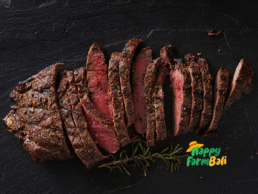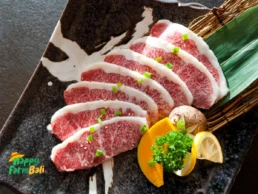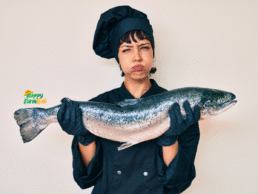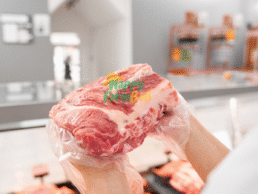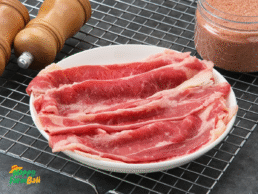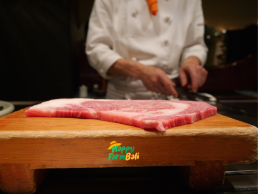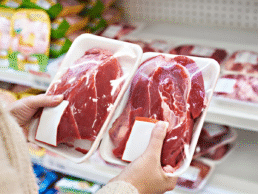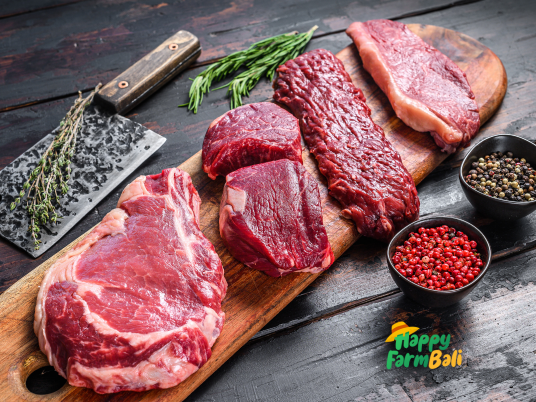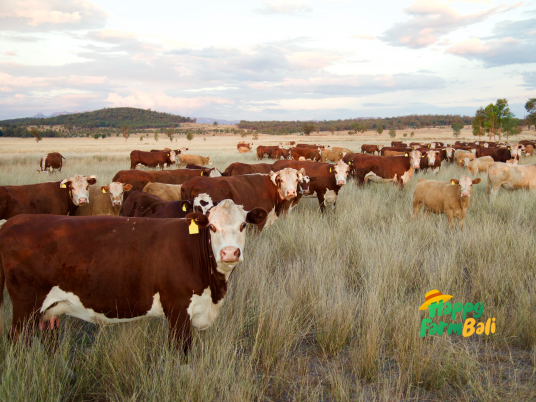Best Gianyar Meat Supplier: Happy Farm Bali
Gianyar Meat Supplier - In the world of culinary and food supply, choosing the right Gianyar Meat Supplier is an essential step to maintain taste, hygiene, and customer trust. In the Gianyar area, the demand for fresh meat continues to grow — from restaurants and hotels to catering services and households. The quality of meat not only determines flavor but also reflects professionalism and commitment to customer satisfaction.
Why Choosing the Right Meat Supplier Matters

For many culinary business owners, Best Gianyar Meat Supplier is more than just a provider of raw ingredients — they are a strategic partner who ensures consistency in taste and quality for every dish served. Fresh, hygienic, and properly distributed meat helps build a reliable brand reputation.
When selecting a meat supplier, several key factors should be considered:
- Product quality and freshness. The meat should come from trusted farms, processed under strict hygiene standards, and stored at ideal temperatures.
- Consistency of supply. Restaurants and hotels rely on a steady supply to avoid disruption in daily operations.
- Competitive pricing. A professional supplier provides stable prices despite market fluctuations.
- Professional service. Quick communication, punctual delivery, and flexible ordering options add great value.
- Legal certification. Licensed and certified Gianyar Meat Supplier guarantee compliance with food safety regulations.
Characteristics of a Reliable Gianyar Meat Supplier
A reputable Gianyar Meat Supplier can be identified by their handling process — from farm to delivery. Professional suppliers maintain hygienic cutting systems, cold storage facilities, and refrigerated transport to ensure freshness throughout the entire distribution chain.
They also apply traceability standards, meaning every meat product can be tracked back to its origin. This transparency provides customers with confidence, knowing their meat is sourced responsibly.
A quality Gianyar Meat Supplier usually offers a wide range of meat products — including beef, chicken, pork, and lamb. Some even provide processed items such as sausages, minced meat, and meatballs at hotel-grade quality. Having a single, reliable supplier for all meat needs saves both time and operational costs.
Distribution Process and Food Safety
The distribution process is a crucial stage in maintaining meat quality. A trusted Gianyar Meat Supplier must implement a well-maintained cold chain system, ensuring that meat remains at the correct temperature from the processing facility to the customer’s kitchen.
This system not only preserves freshness but also prevents bacterial growth that can compromise quality. For hotels and restaurants in Gianyar, food safety is non-negotiable since it directly affects guest satisfaction and brand reputation.
Professional suppliers regularly conduct laboratory tests to guarantee their products are free from harmful chemicals, antibiotics, or residues. As consumer awareness of healthy food increases, customers now prefer Gianyar Meat Supplier that offer safety, transparency, and guaranteed quality.
The Role of Gianyar Meat Supplier in Bali’s Culinary Industry
The presence of Gianyar Meat Supplier plays a vital role in Bali’s thriving culinary industry. Many restaurants, villas, and catering businesses depend on daily meat supply. Any disruption can lead to significant operational issues.
With the rapid growth of tourism and dining businesses in Gianyar, the need for professional meat suppliers continues to rise. Reliable suppliers must balance high demand with product quality, supported by strong logistics, organized inventory management, and responsive delivery teams.
Some Gianyar Meat Supplier are even adopting digital systems that allow customers to order directly through websites or apps — providing real-time pricing and flexible delivery schedules. This modernization proves that the meat supply industry in Gianyar is moving forward with technology.
Benefits of Partnering with a Professional Meat Supplier
Collaborating with a professional Gianyar Meat Supplier offers numerous benefits:
- Guaranteed freshness: Daily supply of fresh meat with strict quality control.
- Ease of ordering: Transparent and fast ordering systems.
- Timely delivery: Efficient logistics ensure business continuity.
- Stable pricing: Protects your operations from sudden market price changes.
- Responsive customer service: A team ready to support every client’s needs.
For both small and large-scale culinary businesses, these factors contribute directly to long-term success. A supplier’s reliability can be the foundation of a strong and consistent brand reputation.
Meat Demand and Market Potential in Gianyar
Gianyar is home to popular tourist destinations such as Ubud, surrounded by luxury villas, restaurants, and cafes. The demand for high-quality meat continues to increase, creating opportunities for Gianyar Meat Supplier to grow and expand their market.
Local consumers are also becoming more selective in choosing food sources. Awareness of clean and healthy eating habits drives them to purchase meat from trusted suppliers that prioritize quality and hygiene.
Furthermore, the rising number of catering services, restaurants, and coffee shops in Gianyar boosts the need for reliable Gianyar Meat Supplier who can provide not only daily supply but also long-term cooperation. This professional approach distinguishes trusted suppliers from ordinary ones.
The Best Gianyar Meat Supplier: From Farm to Table

Finding the best Gianyar Meat Supplier requires careful evaluation. Factors such as business legality, customer testimonials, product quality, and service consistency are crucial indicators. The best suppliers are those who educate their customers about proper meat storage and handling to maintain quality.
For any culinary business, choosing a transparent and professional supplier saves time, cost, and effort in the long run. A steady supply ensures smooth kitchen operations and consistent customer satisfaction.
Happy Farm Bali: Your Trusted Gianyar Meat Supplier
Among the leading names in the region, Happy Farm Bali stands out as a Trusted Meat Supplier. With years of experience in delivering high-quality fresh meat, Happy Farm Bali provides complete solutions for restaurants, hotels, catering services, and households.
Every product is handled through a temperature-controlled supply chain, processed under hygienic standards, and sourced from healthy, well-managed farms. With its commitment to quality, punctual delivery, and professional service, Happy Farm Bali has earned its reputation as one of the best Gianyar Meat Supplier available today.
Choosing the right Gianyar Meat Supplier is an essential investment for anyone who values quality, hygiene, and reliability. In a competitive food industry, fresh and high-quality meat is the foundation of every delicious meal. With trusted suppliers like Happy Farm Bali, the meat supply chain in Gianyar is now safer, more consistent, and more reliable than ever — helping both businesses and households enjoy the finest meat every day.
Happy Farm Bali: Horeca Food Supplier
Horeca Food Supplier - Bali is globally recognized as one of the top tourist destinations, home to thousands of hotels, resorts, villas, and restaurants catering to travelers from every corner of the world. With the rapid growth of the hospitality industry, the demand for premium food ingredients has also increased significantly. From five-star hotels to fine dining restaurants and modern cafés, each establishment requires a reliable Horeca Food Supplier that can consistently deliver premium beef, fresh salmon, and high-quality seafood.
Speed, service excellence, and guaranteed availability are the keys to why a supplier can be considered number one in Bali. Among the many players in the industry, Happy Farm Bali has proven itself as a trusted partner, ensuring the highest quality products and services for Horeca businesses across the island.
The Importance of a Horeca Food Supplier in Bali
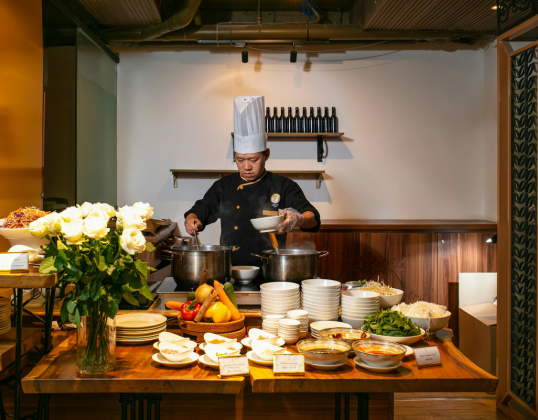
As a world-class tourism hub, Bali does not only showcase its beaches, culture, and luxury accommodations but also its culinary excellence. Hotels and restaurants must deliver dishes that meet international standards and satisfy both local and foreign guests. To achieve this, they rely heavily on a dependable Horeca Food Supplier.
A supplier’s role goes far beyond simply delivering products. They must maintain consistent quality, ensure timely deliveries, and provide a wide selection of premium ingredients. For instance, premium beef must be tender, flavorful, and meet international grading standards. Salmon should always arrive fresh, rich in nutrients, and safe for consumption. Similarly, seafood such as shrimp, crabs, and lobsters must be handled with care to preserve their natural taste and freshness.
Without the support of a trustworthy supplier, it would be nearly impossible for hotels and restaurants to keep their menus consistent, especially during peak tourist seasons or large-scale events.
Premium Beef for the Hospitality Industry
Beef is one of the most essential ingredients in the Horeca sector. Whether for steaks, burgers, or fusion dishes, the quality of beef directly influences the final outcome of a meal. A reliable Horeca Food Supplier must offer premium beef with the perfect marbling, superior texture, and authentic taste.
Happy Farm Bali understands this demand and provides carefully selected premium beef from trusted sources. Every cut is processed with strict attention to freshness and storage quality. With a well-maintained supply chain, chefs across Bali can rely on consistently high-quality beef to deliver outstanding culinary creations.
Fresh Salmon for Hotels and Restaurants
Salmon is one of the most sought-after ingredients, particularly for menus such as sushi, sashimi, and Western-style dishes. The growing trend of healthy dining has also increased the demand for salmon as it is rich in protein and omega-3 fatty acids.
As a Trusted Horeca Food Supplier, Happy Farm Bali ensures salmon arrives in excellent condition. Using strict cold chain distribution systems, they maintain freshness from source to kitchen. This commitment allows hotels and restaurants to confidently serve dishes with salmon that meet international culinary standards.
Premium Seafood: A Tourist Favorite
Beyond beef and salmon, seafood plays a central role in Bali’s hospitality industry. International tourists often seek tropical seafood dining experiences, making dishes such as grilled lobster, prawns, and clams among the most popular choices.
Happy Farm Bali offers a wide selection of seafood with guaranteed freshness and premium quality. Each product is carefully sourced and inspected to ensure only the best reaches their Horeca partners. As a result, hotels and restaurants can serve flavorful, nutrient-rich seafood dishes that leave lasting impressions on their guests.
Service Excellence: The Key to Trust
While product quality is crucial, exceptional service is what builds long-term trust. In the Horeca industry, time is invaluable. Delayed deliveries can directly disrupt restaurant operations or hotel dining services. That’s why a Horeca Food Supplier that prioritizes speed, accuracy, and reliability will always stand out.
Happy Farm Bali has built its reputation not only on product quality but also on professional customer service. With a responsive team, modern distribution systems, and a commitment to punctuality, they continue to be a reliable partner for Horeca businesses in Bali.
Consistent Availability of Ingredients
One of the biggest challenges in the Horeca industry is ensuring the consistent availability of ingredients. Demand can surge unexpectedly during holiday seasons or international events in Bali. A supplier that fails to secure stock risks disrupting hotel and restaurant operations.
Happy Farm Bali addresses this challenge with a strong and stable supply chain. By partnering with trusted sources and maintaining reliable logistics, they guarantee steady supplies of premium beef, salmon, and seafood. This consistency is one of the main reasons why Happy Farm Bali is recognized as a top Horeca Food Supplier on the island.
Why Happy Farm Bali is Number One

Earning the reputation as the number one Horeca Food Supplier in Bali did not happen overnight. Happy Farm Bali has achieved this position through a balanced combination of premium products, outstanding service, and dependable availability. Many renowned hotels and restaurants have chosen them as their primary supplier because of their proven reliability and international-standard quality.
Furthermore, Happy Farm Bali continuously adapts to market trends and client needs. They are not just a supplier, but also a strategic partner that helps Horeca businesses create the best culinary experiences possible.
Recommendations for Horeca Businesses in Bali
For hotel, restaurant, and café owners in Bali, choosing a supplier is not just a logistical decision—it is a long-term business strategy. The right supplier helps maintain consistent quality, optimize operations, and ensure guest satisfaction.
With its proven track record, reputation, and dedication, Happy Farm Bali is the leading recommendation for anyone seeking a trusted Horeca Beef Supplier in Bali. They offer more than premium products—they provide peace of mind with reliable service that supports business growth.
In Bali’s highly competitive Horeca industry, the presence of a dependable food supplier is essential for maintaining world-class culinary standards. Premium beef, fresh salmon, and high-quality seafood are core ingredients that must always be available in top condition. Service excellence and consistent supply are what separate the best suppliers from the rest.
Happy Farm Bali has firmly established itself as Bali’s number one Horeca Food Supplier. With premium ingredients, professional service, and reliable logistics, they are the go-to partner for hotels and restaurants seeking to deliver the finest dining experiences on the island.
Trusted Supplier in Bali for Business
Trusted Supplier in Bali — As Bali continues to grow as a hub for tourism, hospitality, and culinary innovation, the demand for reliable supply chains has never been higher. Whether you run a five-star resort, a beachfront café, or a fine-dining restaurant, sourcing high-quality ingredients is essential to your success. One of the most vital partnerships you can build is with a Trusted Supplier in Bali especially when it comes to fresh meat and seafood.
The right supplier doesn’t just deliver products they become an extension of your business. From consistency and quality to delivery timelines and safety standards, working with a professional Bali distributor company is key to maintaining customer satisfaction and kitchen performance.
The Importance of a Reliable Supplier

Choosing the right supplier can determine the success or failure of any food-based business. Bali’s diverse culinary scene depends on the steady availability of premium ingredients, particularly proteins like beef, lamb, and various seafood selections. Here’s why businesses need a Trusted Supplier in Bali:
- Consistency in Supply: Unreliable delivery can disrupt service. A trusted partner ensures your kitchen is never short on ingredients.
- Food Safety and Certification: Professional suppliers follow health standards, cold chain logistics, and often provide traceable sources.
- Customization & Bulk Orders: Reputable companies understand the business demands of hotels, restaurants, and catering services — offering portion control, custom cuts, and bulk options.
- One-Stop Solutions: A full-scale Bali distributor company can provide both meat and seafood, reducing complexity in sourcing.
What to Look for in a Meat and Seafood Supplier
For businesses in the hospitality or culinary sector, finding a Meat Supplier in Bali and Seafood Supplier in Bali that offers both variety and quality is essential. Here’s what distinguishes top-tier suppliers:
1. Product Variety
Leading suppliers offer a full range of protein options, Australian and local beef, lamb, duck, and pork. On the seafood side, they often stock reef fish, prawns, squid, tuna, and of course, premium imported or locally farmed salmon.
2. Freshness and Quality Control
A Trusted Supplier in Bali will ensure their seafood is handled with strict temperature control and hygiene standards from sea to plate. Similarly, a good Meat Supplier in Bali uses vacuum packaging, cold storage, and cutting-edge distribution systems to maintain freshness.
3. Specialty Products like Salmon
High-end establishments often require specialty items such as Norwegian or Tasmanian salmon. A dependable Salmon Supplier in Bali should be able to provide fresh or frozen salmon fillets, portions, and whole sides with guaranteed quality.
4. Professional Logistics
Prompt and temperature-controlled delivery is a key component of any trusted supplier in Bali. The best companies offer daily or scheduled deliveries across Bali to ensure ingredients arrive in perfect condition — ready to cook and serve.
Happy Farm Bali: The Trusted Supplier in Bali You Can Trust

Among the growing number of suppliers in the region, one name consistently stands out: Happy Farm Bali — recognized by many as the Trusted Supplier in Bali for meat and seafood. As a well-established Bali distributor company, Happy Farm Bali has built a strong reputation for reliability, product quality, and customer service. Their wide catalog covers everything from locally sourced seafood and beef to imported premium meats and an impressive range of seafood. What truly sets them apart is their dedication to supporting businesses with scalable supply options, responsive communication, and consistent delivery schedules.
Whether you’re looking for a trusted Salmon Supplier in Bali or need to secure a steady partnership with a Meat Supplier in Bali, Happy Farm Bali delivers excellence at every stage. Their cold-chain logistics, HACCP-standard handling, and tailored business packages make them a preferred choice for hotels, villas, catering companies, and restaurants across the island.
In Bali’s dynamic business landscape, choosing a Trusted Supplier in Bali is more than just a procurement decision — it's a strategic partnership that supports growth, efficiency, and reputation. With a reliable Bali distributor company like Happy Farm Bali, you gain access to top-quality meats and seafood, timely delivery, and peace of mind.
For any business seeking consistency, excellence, and a long-term partner, Happy Farm Bali is the smart choice — your go-to source and the Biggest Supplier in Bali for all meat and seafood needs.
Premium Meat Dishes for Luxury Hotels in Bali
Premium Meat Dishes — Bali, the Island of the Gods, is globally celebrated for its stunning landscapes, rich culture, and vibrant culinary scene. For discerning travelers staying at a Luxury Hotel in Bali, the gastronomic experience is just as important as the pristine beaches and lavish villas. One of the defining features of five-star dining in Bali is the use of Premium Meat to craft unforgettable dishes that reflect both international standards and local sophistication.
The Demand for Premium Meat in Bali's Luxury Hospitality Scene
Luxury hotels are known for offering only the best, and their culinary departments are no exception. Executive chefs across Bali’s top-tier resorts consistently seek out the finest ingredients to ensure that their menus stand out. Premium Meat particularly high-grade beef is a staple on these menus, elevating everything from classic steak cuts to fusion-inspired creations.
Guests expect dishes that go beyond the ordinary, whether it's a perfectly aged ribeye, a tender filet mignon, or slow-braised short ribs infused with Balinese spices. To meet these expectations, hotels rely on trusted Premium Meat Suppliers for Hotels who can deliver quality, consistency, and traceability.
Sourcing from the Best: The Role of Premium Meat Suppliers in Bali

The journey from farm to table is a critical one, especially in the world of luxury dining. A reliable Premium Beef Supplier in Bali plays a vital role in ensuring that hotels have access to top-tier meats sourced from reputable farms. Whether the meat is imported or locally raised, the supplier must guarantee freshness, proper handling, and compliance with international food safety standards.
High-end resorts such as those in Seminyak, Ubud, and Nusa Dua often work closely with their suppliers to curate custom cuts, specialized aging processes, or even breed-specific options to align with their brand’s identity and the preferences of their elite clientele.
Signature Premium Meat Dishes in Bali’s Luxury Hotels
From beachfront grills to rooftop fine-dining restaurants, Luxury Hotels in Bali showcase a wide array of meat dishes that reflect both Western elegance and Balinese creativity. Some standout offerings include:
- Wagyu Beef Satay with lemongrass marinade and coconut-infused peanut sauce
- Dry-aged Ribeye served with truffle jus and roasted root vegetables
- Beef Rendang Carpaccio, a fusion of traditional Indonesian flavors with modern presentation
- Grilled Tomahawk Steak for sharing, accompanied by heritage sauces and artisanal salts
These dishes are not only a treat for the taste buds but also a visual feast, curated to create a multi-sensory luxury dining experience.
What to Look for in a Premium Meat Supplier for Hotels

Selecting the right Premium Meat Supplier for Hotel operations goes beyond price. Key factors include:
- Traceability: Knowing exactly where the meat comes from, how the livestock was raised, and how it was processed
- Consistency: Providing uniform quality across orders
- Customized Service: Offering specialized cuts, packaging, and delivery schedules
- Sustainability: Adhering to ethical and environmentally friendly practices
These standards are not just trends—they're necessities for maintaining the high reputation of luxury establishments.
Why Happy Farm Bali is a Trusted Choice
For hotels and resorts aiming to elevate their meat offerings, Happy Farm Bali stands out as a reliable and premium choice. Renowned as a leading Premium Beef Supplier in Bali, Happy Farm Bali combines top-tier meat sourcing with unmatched service. Their carefully curated selection includes grass-fed, grain-finished, and specialty beef cuts designed to meet the rigorous demands of Bali’s luxury hospitality sector.
Moreover, Happy Farm Bali prioritizes quality control, cold-chain logistics, and personalized partnerships with chefs, making them an ideal Premium Meat Supplier for Hotels that want to stay ahead in the competitive luxury market.
In conclusion, the culinary journey in a Luxury Hotel in Bali is incomplete without exceptional meat dishes that reflect both artistry and quality. By collaborating with trusted suppliers like Happy Farm Bali, these establishments ensure their guests enjoy the very best in Premium Meat—every plate, every time.
Best Premium Beef Supplier in Bali 2025
Best Premium Beef Supplier
Premium Beef
Premium Beef Supplier - Choosing the right premium beef supplier is an important step for culinary businesses and households that prioritize quality. Premium meat not only offers a more delicious taste but also has a more tender texture and better nutritional content. Therefore, ensuring that the meat obtained comes from a trusted supplier is key to getting the best raw materials.
A premium beef supplier must be able to provide fresh, hygienic products that have undergone cutting processes in accordance with health standards. In addition, they usually collaborate with quality farms that implement the best husbandry methods to ensure the produced meat has optimal quality. The safety and halal status of the products are also key factors that consumers must consider before choosing a meat supplier.
Amid the increasing demand for high-quality meat, many suppliers claim to be premium beef suppliers. However, not all are able to meet the expected standards. Therefore, it is important for consumers to conduct research first, compare prices, and evaluate customer testimonials before making a choice. By choosing the right supplier, both culinary businesses and households can ensure that they get the best meat for their needs.
Types of Premium Beef Supplier Products
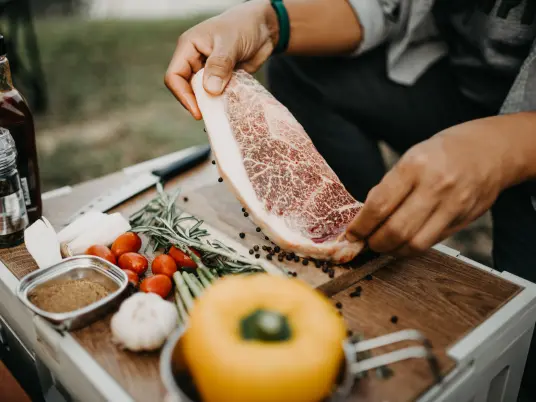 Premium beef is of the highest quality with a softer texture, richer flavor, and balanced fat content. This product usually comes from cattle raised with special standards, such as high-quality feed and a hygienic slaughtering process. Here are some of the most sought-after premium beef supplier products in the market.
Premium beef is of the highest quality with a softer texture, richer flavor, and balanced fat content. This product usually comes from cattle raised with special standards, such as high-quality feed and a hygienic slaughtering process. Here are some of the most sought-after premium beef supplier products in the market.
Wagyu
The evenly distributed marbling gives this meat a soft texture and a distinctive savory taste. Wagyu is divided into several grades, ranging from A3 to A5, with A5 being the best quality.
USDA Prime Beef
This meat comes from the United States and is one of the internationally recognized high quality meat types.
Angus Beef
Derived from the Aberdeen Angus breed of cattle from Scotland. It is known for its tenderness and rich flavor due to its good marbling.
Tenderloin
Because it is located on the inside of the cow's body that is rarely used for activity, it is very tender and has almost no coarse fibers.
Sirloin
Comes from the back of the cow and has a slightly denser texture than the tenderloin. This cut remains tender if cooked properly and is usually used for steak or grill.
Ribeye
Has a balanced combination of meat and fat. The evenly distributed fat gives it a distinctive savory flavor when grilled or seared.
Short Ribs
A cut of meat that comes from the ribs of a cow and has a rich layer of fat and meat fiber.
Choosing the right type of premium beef product depends on your needs and the type of dish you want to make. From Wagyu which is known for its tenderness to ribeye which is rich in flavor, each cut has its own characteristics. By understanding the differences between each type, you can enjoy high-quality beef in the best way possible.
Japan's World-Famous Premium Beef
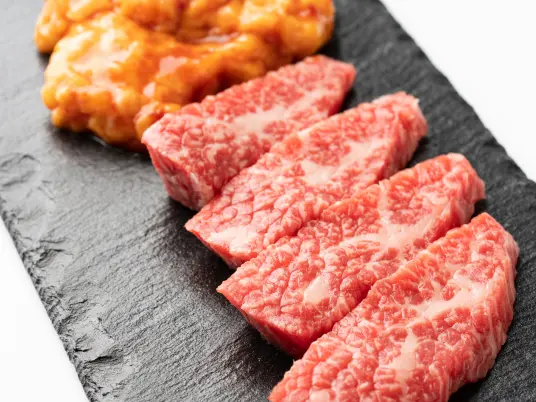 Japanese Premium Beef has long been known as one of the best meats in the world, with exceptional quality and a distinctive flavor. One of the most famous types is Wagyu, beef with a tender texture and even fat marbling. This specialty makes it highly sought after by food enthusiasts in various countries. The process of raising Wagyu cattle is also very strict, with special care that ensures the meat has a rich and juicy flavor.
Japanese Premium Beef has long been known as one of the best meats in the world, with exceptional quality and a distinctive flavor. One of the most famous types is Wagyu, beef with a tender texture and even fat marbling. This specialty makes it highly sought after by food enthusiasts in various countries. The process of raising Wagyu cattle is also very strict, with special care that ensures the meat has a rich and juicy flavor.
Wagyu comes from several regions in Japan, such as Kobe, Matsusaka, and Omi, each of which has unique characteristics. This meat is known for its healthier unsaturated fat content compared to regular beef, making it not only delicious but also better for health. The breeding methods employed by Japanese farmers, such as providing high-quality feed and a calm environment, make Wagyu a premium meat with high standards.
The popularity of Japanese Premium Beef is now spreading to various parts of the world. Luxury restaurants in Europe, America, and Asia are racing to serve Wagyu as a special dish. In fact, some countries have started breeding Wagyu cattle to meet the ever-increasing demand. However, the authenticity and quality of the original Wagyu from Japan remain an unmatched star, making it a symbol of luxury in the culinary world.
Premium Beef Supplier in Bali
Finding a premium beef supplier in Bali certainly requires meticulousness to obtain the best quality products. With the increasing demand for premium beef, whether for restaurants, hotels, or personal consumption, it is important to choose a reliable supplier. High-quality meat not only guarantees a more delicious taste but also ensures the safety and freshness of the consumed product.
One of the best recommendations for getting premium beef in Bali is Happy Farm Bali. As a widely recognized supplier, Happy Farm Bali offers a variety of high-quality meats, including Wagyu, with good storage standards and professional distribution. Their commitment to providing fresh and high-quality meat makes them the top choice for many restaurants and customers in Bali.
With the presence of a trusted supplier like Happy Farm Bali, premium beef lovers can now more easily obtain the best products without worrying about quality and authenticity. For anyone who wants to enjoy the best culinary experience, choosing meat from a quality supplier is an important step. Happy Farm Bali is the right solution for those who prioritize quality, safety, and deliciousness in every dish.
The Importance of Choosing a Reputable Salmon Distributor
Salmon Product
Salmon Distributor - Salmon has long been a star in the culinary and health worlds. With their tender meat texture, rich flavor, and abundant nutritional content, salmon-based products are increasingly favored by various groups. Starting from luxurious dishes in restaurants to practical preparations that can be enjoyed at home, salmon offers flexibility in presentation that can satisfy anyone's palate. However, the appeal of salmon lies not only in its taste but also in its extraordinary health benefits.
Salmon fish products now come in various variants to meet the needs of modern consumers. Fresh fillets, smoked salmon, and ready-to-eat preparations like sushi and salad have all become popular choices in the market. Not only that, innovations in processing have also made salmon available in the form of healthy snacks, such as salmon skin chips and salmon floss. This flexibility makes salmon an ideal choice for those who want to enjoy highly nutritious food without sacrificing taste and convenience.
Compared to other types of fish, salmon is rich in omega-3, vitamin D, and high-quality protein, which are excellent for supporting heart, brain, and skin health. It's no wonder that salmon products have become part of a healthy lifestyle in various parts of the world. This article will delve deeper into the uniqueness of salmon, various products that can be enjoyed, and tips for selecting quality salmon for daily consumption. Finding the best seafood supplier for your culinary business is key. Here are the best salmon distributors!
Looking for the Best Salmon Distributor in Bali
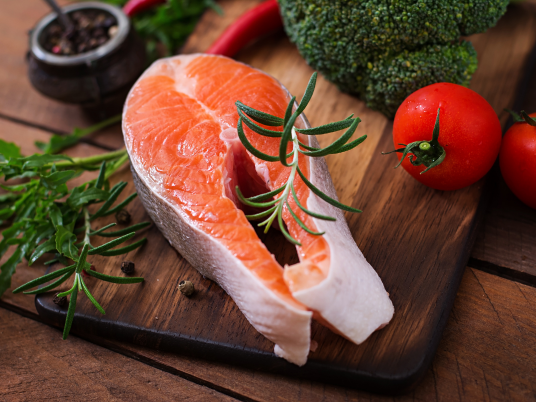 Bali is not only famous for its natural beauty and culture but also as a culinary paradise that offers a variety of quality dishes, including those made with salmon. With the increasing demand for salmon, whether for restaurants, hotels, or catering businesses, the need for reliable salmon distributors in Bali is also on the rise. However, finding a distributor capable of providing high-quality salmon at competitive prices is not an easy task.
Bali is not only famous for its natural beauty and culture but also as a culinary paradise that offers a variety of quality dishes, including those made with salmon. With the increasing demand for salmon, whether for restaurants, hotels, or catering businesses, the need for reliable salmon distributors in Bali is also on the rise. However, finding a distributor capable of providing high-quality salmon at competitive prices is not an easy task.
The presence of quality salmon distributors is crucial to ensuring a supply of fresh fish that meets food safety standards. Fresh salmon not only offers a more delicious taste but also maintains its nutritional content optimally. Therefore, culinary entrepreneurs in Bali need to be meticulous in choosing distributors who understand the importance of product quality, delivery consistency, and good customer service. Trusted distributors are also usually able to provide information about the origin of the fish and its processing methods, which adds value for consumers.
This article will help you explore tips and guidelines for finding the best salmon distributor in Bali. Starting from identifying the characteristics of a professional distributor, understanding the types of salmon products available, and ensuring the price matches the quality, everything will be reviewed to help you make the right decision. With the right distributor, your need for quality salmon for your business or personal consumption in Bali will be met easily and satisfactorily.
Salmon Distributor for Business
Choosing the right salmon distributor for culinary business is a crucial step. As a premium food ingredient, salmon requires special handling to maintain its quality from the producer to the consumer. Professional distributors will ensure that the storage and delivery processes are carried out to high standards, such as using advanced cooling technology to maintain the freshness of the fish. In addition, they usually offer a variety of salmon products, ranging from fresh fillets and steaks to smoked salmon, which can be tailored to your business needs.
The sustainability of supply is also an important factor in choosing a distributor. A business needs a consistent supply of salmon to meet customer demand without being disrupted by logistical issues. A good distributor will have a strong supply network, ensuring that products remain available despite fluctuations in weather or seasons. In addition, they also tend to have transparency in providing information about the origin of the salmon they sell, whether from farmed sources or wild catches. (wild-caught). This helps you provide quality assurance to consumers.
Equally important is the professional working relationship between your business and the distributor. A reliable salmon distributor not only offers quality products but also provides responsive customer service, technical support, and competitive pricing. Some distributors even offer special discount programs or free shipping services for bulk purchases. By choosing the right distributor, you not only get the best products but also strengthen your business's competitiveness in delivering salmon-based dishes that satisfy customers.
Choosing the Best and Most Trusted Salmon Distributor
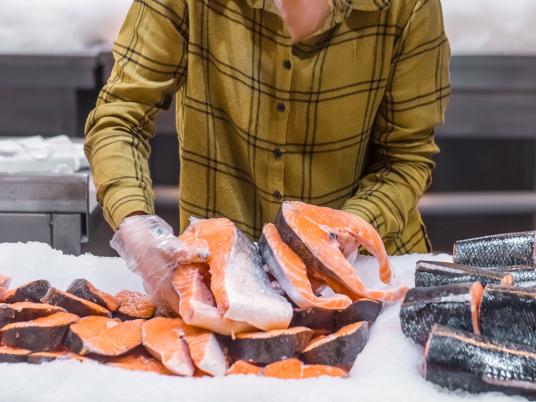 Choosing the best and trusted salmon distributor is an important step to ensure you get high-quality, fresh, and safe products for consumption. Here are some tips to help you choose the best salmon distributor:
Choosing the best and trusted salmon distributor is an important step to ensure you get high-quality, fresh, and safe products for consumption. Here are some tips to help you choose the best salmon distributor:
Distributor Reputation
To ensure quality, look for reviews and customer testimonials on the salmon distributor's website or platforms, such as social media and marketplaces, and ask for recommendations from friends or colleagues who have previously purchased salmon from that distributor.
Ensure Certification and Legality
Ensure that the distributor has official business permits, such as SIUP or other certifications, and meets food safety standards with certifications like HACCP or other food eligibility certifications.
Product Quality
Ensure that the salmon sold is fresh, with characteristics such as bright flesh color, elastic texture, and no sharp fishy smell. Also, check the type of salmon offered (such as Atlantic Salmon or Sockeye Salmon) to ensure it meets your needs, and make sure the distributor uses adequate cold storage or freezer methods to maintain product quality.
Price
Compare prices with market prices, avoid distributors who offer prices that are too low because the quality may be questionable, and ensure that reputable distributors provide a transparent breakdown of costs, including shipping fees if applicable.
Guarantee and Return
Choose a distributor that provides a guarantee if the product is damaged or does not meet specifications, and ensure there is a clear refund or return policy if the product does not meet standards.
Service
Choose a distributor with responsive and friendly customer service, ensure they have an easily accessible online ordering system, and offer fast delivery with facilities that maintain the freshness of the fish.
Distributor Location
If possible, choose a distributor close to your location to ensure the salmon's freshness is better guaranteed during delivery.
Salmon Source
Make sure you know the origin of the salmon, whether it comes from local farms or is imported from countries like Norway, Japan, or Canada, and choose a reputable distributor who usually provides information about the reachable or origin of their products.
Handling Process
The handling process, such as cutting, packaging, and transportation, must comply with food hygiene and safety standards.
By considering the tips above, you can be more confident in choosing a salmon distributor that provides the best quality products for your needs.
Bali Seafood Distributor
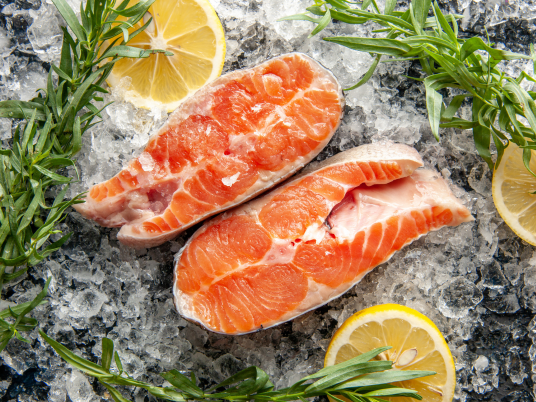 Choosing the right seafood distributor is an important step to ensure the smooth operation of your culinary business in Bali, especially if salmon is one of the main ingredients you use. A professional distributor will guarantee the quality, freshness, and consistency of seafood supply, including salmon, which is highly sought after by customers. With the abundance of choices in Bali, it is important to collaborate with a distributor that not only provides quality products but also has reliable service.
Choosing the right seafood distributor is an important step to ensure the smooth operation of your culinary business in Bali, especially if salmon is one of the main ingredients you use. A professional distributor will guarantee the quality, freshness, and consistency of seafood supply, including salmon, which is highly sought after by customers. With the abundance of choices in Bali, it is important to collaborate with a distributor that not only provides quality products but also has reliable service.
One of the best recommendations for quality salmon needs in Bali is Happy Farm Bali. This distributor is known for its commitment to providing fresh seafood products, including premium salmon that meets international standards. Happy Farm Bali not only offers a variety of quality products but also supports sustainable practices in seafood management. With a strong supply network and modern storage technology, Happy Farm Bali has become the top choice for culinary business operators who prioritize quality and trust.
By collaborating with distributors like Happy Farm Bali, you not only get the best salmon products for your business but also service support that ensures your supply needs are consistently met. The quality of their products, combined with a good reputation, makes Happy Farm Bali the ideal solution to ensure your customer satisfaction. If you are looking for a reliable seafood distributor in Bali, Happy Farm Bali is the right business partner to help you deliver the best dishes to your customers.
The Best Bali Meat Distributor 2025
Meat Distributor
Bali Meat Distributor - Bali, an exotic Indonesian island known as a world-class tourist destination, also has a fast growing culinary industry. In recent years, the demand for high-quality food ingredients, especially meat, has increased along with the many new restaurants, cafes, and hotels that have been established. As such, the role of Bali Meat Distributor has become very important in maintaining the quality and supply of meat across the island. For culinary and hospitality businesses, finding a reliable meat distributor is key to maintaining customer satisfaction and preserving the quality of their dishes.
As the main meat distributor in Bali, Best Bali Meat Distributor provides various types of meat, ranging from beef to other processed products that meet food safety standards. Unlike other meat distributors, they are committed to providing fresh and high-quality products sourced directly from selected farms. This not only meets the needs of the local market, but also adheres to international standards that ensure that the products provided are safe, healthy, and of premium quality.
Not only serving restaurants and hotels, Bali Meat Distributor has also started to venture into the retail market, providing products to local people who are looking for quality food ingredients for daily consumption. With the increasing trend of cooking at home, more and more people are interested in finding quality products that are easily accessible. Meat distributors like Bali Meat Distributor help fulfill this need by providing quality and affordable meat. By doing so, Bali Meat Distributor not only supports the culinary industry in Bali but also contributes to improving the quality of life of local communities.
Important Role of the Beef Distributor
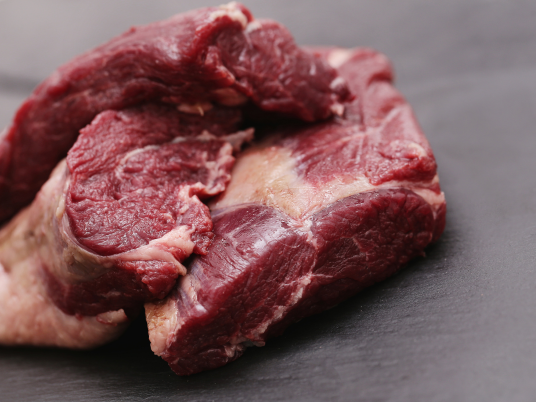 In the culinary and hospitality industry, the existence of a reliable meat distributor plays a very important role. Meat distributors are not only in charge of providing meat supplies, but also maintaining the quality and safety of the products that will be consumed by end customers. In the midst of increasing demand for high-quality food products, Bali meat distributors have become key partners for restaurants, hotels, and supermarkets in ensuring that the raw materials they serve come from trusted sources and meet strict quality standards.
In the culinary and hospitality industry, the existence of a reliable meat distributor plays a very important role. Meat distributors are not only in charge of providing meat supplies, but also maintaining the quality and safety of the products that will be consumed by end customers. In the midst of increasing demand for high-quality food products, Bali meat distributors have become key partners for restaurants, hotels, and supermarkets in ensuring that the raw materials they serve come from trusted sources and meet strict quality standards.
Professional meat distributors understand that maintaining the quality of meat, from the processing process to the delivery to consumers, is a top priority. Good quality meat not only affects the taste of the dishes, but also the health of the consumers. Therefore, meat distributors generally work with farms or producers that implement sustainable and ethical farming practices. In addition, they also conduct strict inspections, starting from the slaughtering, packing, and shipping processes, to ensure that the meat that reaches consumers remains fresh and high quality.
In this modern era, the role of Bali meat distributors is expanding with special demands from consumers, such as organic meat, antibiotic-free meat, or meat with environmentally friendly animal husbandry. Meat distributors that are able to meet these market demands are the first choice for culinary businesses that want to offer superior products to their customers. In addition, distributors that are flexible in dealing with changing market needs are also able to support the sustainability of the culinary business and provide added value to its customers. Thus, the role of meat distributors is essential not only in maintaining product quality but also in responding to evolving market needs.
Considerations to Make When Choosing a Best Distributor for Culinary Business
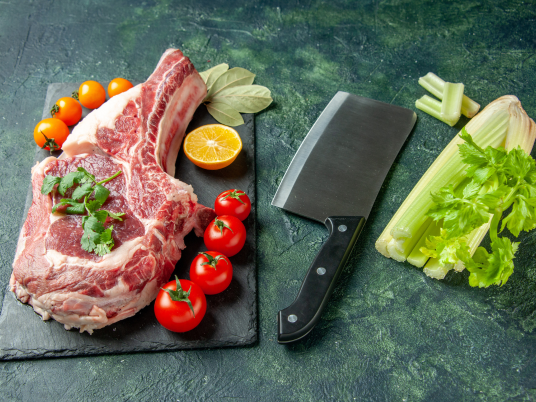 Choosing the best distributors for culinary business is an important step that will affect the overall quality and success of your business. One of the key considerations is the quality of the raw materials offered by the distributor. The quality of raw materials, especially meat, vegetables and other fresh produce, has a huge impact on the taste and healthiness of the food served. Make sure the distributor has high quality standards and is able to guarantee consistent quality over time. Not only that, it is also important to check whether the distributor has certifications that guarantee product safety and hygiene, such as food safety certificates from relevant agencies.
Choosing the best distributors for culinary business is an important step that will affect the overall quality and success of your business. One of the key considerations is the quality of the raw materials offered by the distributor. The quality of raw materials, especially meat, vegetables and other fresh produce, has a huge impact on the taste and healthiness of the food served. Make sure the distributor has high quality standards and is able to guarantee consistent quality over time. Not only that, it is also important to check whether the distributor has certifications that guarantee product safety and hygiene, such as food safety certificates from relevant agencies.
In addition to quality, the distributor's ability to provide raw materials consistently is also an important factor to consider. Distributor reliability in delivering products on time as needed greatly affects the smooth operation of the culinary business. When raw materials arrive on time and in good condition, kitchen operations can run smoothly without any interruption. It's best to choose a distributor that has a reliable and flexible logistics system in handling changes in orders or sudden needs. Thus, the risk of delays or shortages of raw materials can be minimized, and the business can continue to operate smoothly.
Then, also consider the price factor and long-term partnerships with distributors. Competitive pricing is certainly important, but quality should not be sacrificed just for the sake of lower costs. Look for distributors who provide prices in line with quality and can become long-term partners to support your business growth. A good partnership with a distributor can provide many benefits, such as ease of price negotiation, additional support in terms of product promotion, or special discounts for certain orders. By choosing suitable and reliable Bali meat distributor, your culinary business will have a strong foundation to continue to grow in the midst of intense market competition.
Best Bali Meat Distributor 2025
In the culinary industry, finding a reliable meat distributor is one of the main keys to maintaining quality and customer satisfaction. As a highly sensitive raw material, meat requires proper handling from animal selection, slaughtering process, storage, to delivery. A good Bali meat distributor must meet high standards of hygiene, quality and food safety to ensure that the meat remains fresh and fit for consumption until it reaches the kitchen. Choosing a trusted meat distributor also helps culinary businesses meet customer expectations for the quality of taste and healthiness of the food served.
In Bali, one of the most reputable Bali meat distributors is Happy Farm Bali. Happy Farm Bali is committed to providing high-quality meat with a wide selection of products, ranging from beef to other processed meats. The meat provided by Happy Farm Bali is carefully processed through stages that ensure quality and safety. They have strict standards in animal selection and meat processing, so restaurants and culinary businesses in Bali can rely on them as a source of quality meat. For business owners who want to maintain their reputation and the quality of their dishes, Happy Farm Bali is an option worth considering.
In addition to the quality of their products, Happy Farm Bali also offers convenience in terms of delivery and customer service. With an organized and responsive logistics system, they are able to guarantee that their meat supplies arrive on time and in top condition. This flexibility is very helpful for culinary businesses, especially when there are sudden needs or large orders. With experience and commitment to quality, Happy Farm Bali is a top recommendation as a trusted meat distributor in Bali that can be relied upon to support the success of a culinary business.
How to Choose and Cooking Beef Short Plate
Beef Short Plate
Short plate beef is a cut of beef located at the bottom of the rib cage, between sirloin and brisket. This cut is famous for having a lot of marbling, which gives it flavor and tenderness when cooked. Short plate is commonly used in a variety of dishes, from steaks to barbecue, and is often the base for signature dishes such as bulgogi or carne asada. The delicacy and rich flavor of this meat make it highly desirable to culinary enthusiasts.
To properly prepare beef short plate, it is important to pay attention to the cooking method. Techniques such as grilling or braising are highly recommended, as they bring out the natural flavors and deliciousness of this cut of meat. Before cooking, the meat should be marinated to enhance the flavor, and the grilling or slow cooking process will help to tenderize the meat fibers, resulting in a tender and delicious dish. With the right processing, short plate meat can be an appetizing and satisfying dish.
Sliced Meat Production Process
The process of making sliced meat into market-ready beef short plate starts with the selection of quality raw materials. Cattle farmers usually select cattle with superior genetics and good feeding to produce marbling-rich meat. Once the cattle reach the ideal age and weight, they are slaughtered in a slaughter facility that meets hygiene and safety standards. This process is important to ensure that the meat produced is fresh and of high quality.
After slaughtering, the meat will go through a cleaning and preprocessing process. The short plate meat, located at the bottom of the rib cage, is then separated from the other parts. Experienced personnel will perform the cutting carefully to ensure proper size and shape. Once cut, the meat will be cleaned of excess fat and bones, before being put through a chilling process to preserve its freshness. Refrigeration also helps to improve the texture of the meat, making it more tender when cooked.
After the cooling process, the beef short plate is ready to be marketed. Before being sold, the meat will usually be neatly packaged, either in slices or whole pieces, to attract consumers' attention. Labels on the packaging often include information on the origin of the meat and proper storage methods. With a meticulous process from raw material selection to packaging, short plate meat is ready to meet market demand and pamper the tongues of culinary lovers.
Variety of Beef Short Plate Processions
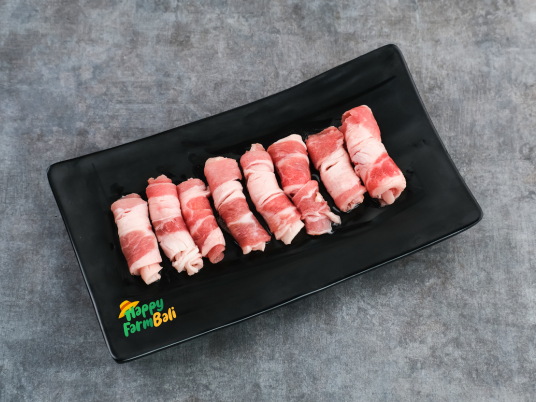 Beef shortplate comes in many impressive varieties, each reflecting the unique culinary cultures of different countries. In Asia, one of the most famous preparations is bulgogi from Korea. In this dish, slices of bee short plate are marinated in a mixture of soy sauce, sugar, sesame oil and garlic, then grilled over high heat. Bulgogi is usually served with rice and a variety of vegetables, and is used as a main dish in various events and celebrations.
Beef shortplate comes in many impressive varieties, each reflecting the unique culinary cultures of different countries. In Asia, one of the most famous preparations is bulgogi from Korea. In this dish, slices of bee short plate are marinated in a mixture of soy sauce, sugar, sesame oil and garlic, then grilled over high heat. Bulgogi is usually served with rice and a variety of vegetables, and is used as a main dish in various events and celebrations.
In Mexico, short-rib meat is the star of carne asada. The meat is seasoned with a combination of spices, such as cumin and paprika, then grilled until browned. Carne asada is usually served in tacos or burritos, with salsa, guacamole and fresh vegetables. The smoky and savory flavor of beef short plate makes it the perfect choice for everyday meals or parties. The variety of flavors and presentation makes this dish very popular among food lovers.
In Western countries, beef short plate is often made into a delicious steak. This cut can be grilled or pan-fried with simple seasonings, such as salt and pepper, to bring out its natural flavors. Short plate steak is also often served with chimichurri sauce or BBQ sauce, which adds a rich dimension of flavor. Aside from steak, the meat can also be used in stew dishes, such as French-style pot au feu, where the meat is slow-cooked with vegetables and herbs to produce a thick, flavorful broth. This variety of preparations shows how versatile short plate meat is, making it a sought-after ingredient in kitchens around the world.
How to Process Beef Short Plate
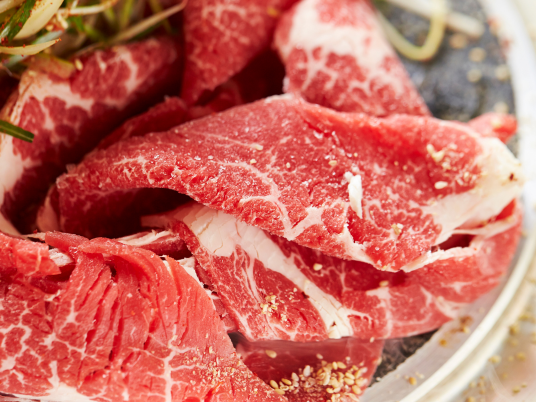
Processing beef short plate in the right way is essential for a delicious and tender result. First of all, choosing the appropriate cooking method will greatly affect the texture and flavor of the meat. Grilling is one of the best ways to prepare short plates, as the high heat brings out the umami flavor and makes the meat juicy. Before cooking, it is important to marinate the meat with a rich seasoning mix, such as soy sauce, garlic, and other spices, so that the meat absorbs the flavors and becomes more tender.
In addition to grilling, the braising or slow cooking method is also very suitable for short plate meat. In this process, the meat is cooked in a liquid, such as stock or sauce, at a low temperature for several hours. This technique helps to soften the fibers of the meat, resulting in a tender and flavorful dish. Before braising, be sure to browning the surface of the meat to give it an additional layer of flavor. Dishes such as pot au feu or stew can be produced this way, where the meat is served with vegetables and a thick broth.
Finally, it is important to pay attention to the cooking time. Short plate meats should not be overcooked to prevent them from becoming tough. For steaks, proper cooking time on each side will ensure the meat stays juicy, while for braising dishes, check the tenderness of the meat periodically. After cooking, let the meat rest for a while before slicing, so that the juices can soak in. By following these steps, you can enjoy the perfect short plate meat, with rich flavors and satisfying textures.
Bali Meat Supplier
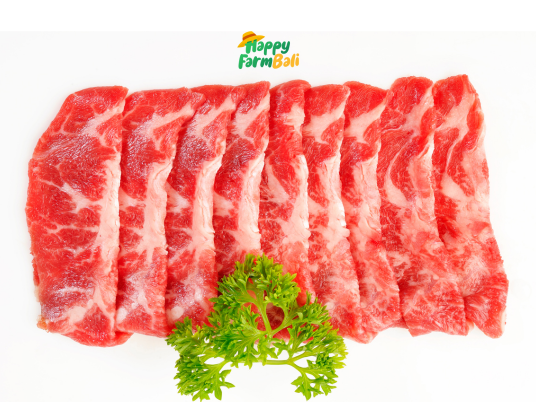
When it comes to choosing quality short plate meat, having a reliable bali beef supplier is essential to ensure the freshness and deliciousness of the product. In Bali, one meat supplier worth considering is Happy Farm Bali. Known for its commitment to quality, Happy Farm Bali provides beef that is well raised and processed to a high standard.
Happy Farm Bali offers a variety of meat cuts, including short plates, which can be used for various culinary preparations. With fast delivery services and neat packaging, customers can easily get fresh meat straight to their doorstep. In addition, they also provide information on how to choose and process the right meat, so you can cook satisfying dishes with confidence. The quality and service provided make Happy Farm Bali an ideal choice for foodies on the island.
With the wide variety of preparations that can be made from short plate meat, finding the right supplier like Happy Farm Bali will help you bring special dishes to the table. By ensuring the quality of the meat, you will not only enjoy the delicacy in every bite, but also be able to share an unforgettable culinary experience with family and friends. So, if you are in Bali and looking for quality meat, Happy Farm Bali is the perfect solution to fulfill your needs.
The Best Way to Serve A5 Wagyu Beef
A5 Wagyu Beef
With the highest classification in the Japanese meat grading system, A5 Wagyu Beef is a symbol of culinary luxury. It is one of the finest beef in the world with the best flavor, tenderness, and superb marbling. This beef comes from Wagyu cattle raised in a special way to produce perfect intramuscular fat and melt-in-the-mouth texture when eaten. The main feature of A5 Wagyu is its marbling pattern, which not only affects the appearance, but also the flavor and aroma of the meat. The fat is evenly distributed throughout the meat fibers resulting in a deep savory flavor and tender consistency that is not easily found in other types of beef.
In the culinary world, A5 Wagyu beef is often the target of five-star chefs and high-end culinary enthusiasts. Its exceptional quality makes it suitable for a variety of cooking methods, from simple steaks to traditional Japanese dishes such as sukiyaki and shabu-shabu. With its luxurious price tag, A5 Wagyu is not just enjoyed as food, but also as an exclusive culinary experience. Of the many ways, how exactly
How much does A5 Wagyu Beef cost?

The price of A5 Wagyu beef is notoriously high, despite its premium quality. Depending on the origin, cut, and distribution method, it can cost hundreds to thousands of dollars per kilogram in the global market. A5 Wagyu originating from Japanese regions such as Kobe, Matsusaka, or Omi often has a higher price due to its worldwide popularity. A serving of A5 Wagyu steak can cost between 100 to 300 dollars in a fine dining restaurant, depending on the size and the way it is served.
The main factors affecting the price of A5 Wagyu beef are the perfect marbling and the highly selective production process. Wagyu cattle are raised with special methods, fed high-quality feed, and treated with great care to reduce stress as it can affect the quality of the meat. This process is time-consuming and costly, which affects the selling price of the meat. In addition, the limited number of Wagyu cattle and high global demand also drive up the price, making A5 Wagyu a symbol of culinary luxury.
Imported A5 Wagyu is generally more expensive due to shipping costs and import taxes. Some countries, such as the United States and Australia, also produce their own local versions of Wagyu, but the price is often slightly lower than Wagyu imported directly from Japan. Nonetheless, A5 Wagyu beef, whether local or imported, remains in the high-end market segment, offering an exclusive culinary experience. Because wagyu is not only about taste, but also status and prestige.
Types of Wagyu A5 Cattle
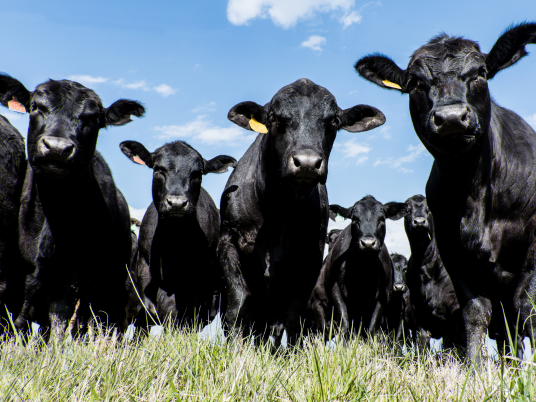
A5 Wagyu beef is a type of beef that comes from Wagyu cattle, a species of cattle native to Japan that is known for its exceptional quality. The word “Wagyu” itself means “Japanese cow” (Wa = Japanese, Gyu = cow). What sets Wagyu beef apart from other types of beef is the marbling or pattern of fat evenly distributed throughout the meat fibers, which gives it a tender texture and rich flavor. The letter “A” in Wagyu A5 refers to the overall quality level, while the number “5” indicates the highest level in the Japanese meat grading system, specifically in terms of marbling, color, texture, and fat quality.
The cattle that produce Wagyu meat come from four main Japanese cattle breeds, all of which are known for their ability to produce high-quality meat with distinctive marbling. These four breeds of cattle are:
- Kuroge Washu (Japanese Black) is the most dominant cattle breed, producing about 90% of all Wagyu meat in Japan. Kuroge Washu is known for its outstanding marbling ability. The meat from this cow is the most famous for A5 wagyu.
- Akaushi (Japanese Brown or Red Wagyu) has a slightly lower fat content compared to Kuroge Washu. It offers a stronger beef flavor, with a balance between tenderness and flavor intensity.
- Nihon Tankaku Washu (Japanese Shorthorn) produces meat with a strong flavor and lower fat content than Kuroge Washu, but still with a tender texture. There is less marbling compared to other Wagyu types, but the beef flavor is more intense.
- Mukaku Washu (Japanese Polled) This breed of cattle is less common and less produced than the other breeds. Mukaku cattle produce meat with moderate marbling and a slightly different flavor, but still offer excellent quality.
All of these Wagyu cattle breeds are raised with special methods that aim to improve the quality of the meat, resulting in a premium beef product with unique flavor characteristics and a very tender texture.
A5 Wagyu beef is produced from cattle that are raised with the utmost care. Wagyu cattle receive special care, from a well-regulated diet to a strictly maintained living environment. The cattle are fed high-quality feed, including grain, corn, and straw, which contribute to the development of unique intramuscular fat. This grooming process is done with the aim of producing meat that is not only tender, but also has a special flavor and aroma.
Difference between A5 Wagyu and Other Grades
Wagyu beef grading is done by the Japan Meat Grading Association (JMGA) which uses a very strict grading system. The A5 score is given to meat that has the highest level of marbling, with the fat spread evenly and smoothly within the meat fibers. This fat gives the meat a savory taste and exceptional tenderness, making it “melt” in the mouth. In addition to marbling, the color, luster, and texture of the meat also affect this score.
The level of marbling, texture, flavor, and tenderness is what sets A5 Wagyu apart from other types. A5 Wagyu is the highest level in the Japanese grading system, which grades meat based on things like color, fat quality, and marbling pattern, or intramuscular fat distribution. Lower grades of Wagyu beef, such as A3 or A4, still have marbling, but the texture is weaker and less melting, and the flavor is rich savory.
In terms of texture, A5 Wagyu has unparalleled tenderness as the fat infiltrated into the muscle makes the meat fibers break down more easily during cooking. Lower grades, such as B3 or B4, may still offer tenderness, but not to the same extent as A5. As a result, A5 is more often the top choice in fine dining, while other grades offer a more affordable alternative, but still with good meat quality.
The Best Way to Cook A5 Wagyu Beef
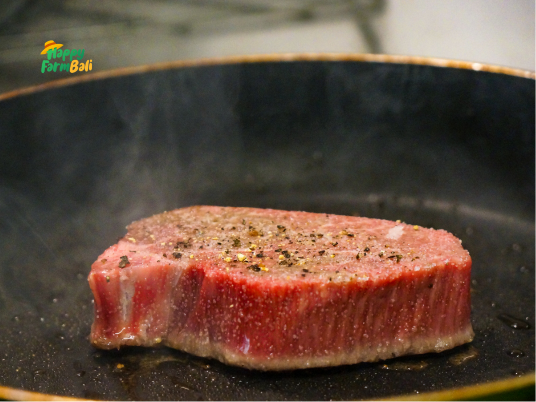
To maintain the original quality of A5 Wagyu beef, reduce the spices and techniques that are too complex. With perfect marbling, A5 Wagyu only needs salt and pepper as the main seasoning to have a rich flavor and tender texture. Grilling or searing at high temperature for a few minutes on each side is the most common cooking method. This technique allows the fat in the meat to melt, creating a caramelized layer on the outside of the meat without damaging the tenderness inside. Filling an iron skillet or grill with a small amount of oil, or even no oil, will yield the best results.
Also, it is important to pay attention to the temperature when cooking A5 Wagyu beef. It is best to cook the meat to rare or medium-rare doneness, to preserve the tender texture and retain the marbling that melts perfectly in the mouth. Overcooking the meat may cause the marbling fat to dissolve excessively and lose the essence of Wagyu's deliciousness. For serving, A5 Wagyu beef is usually served in small pieces as the high fat content makes it filling quickly. Wagyu is also often paired with light accompaniments, such as white rice or steamed vegetables, to maintain the balance of flavors.
Top Secrets to Choosing a Beef Supplier to Culinary Industry
Beef Supplier
Beef supplier are companies or organizations that provide beef to consumers, businesses and restaurants. They are responsible for the production, processing and distribution of beef products. These suppliers can range from small, local businesses to large-scale commercial operations, and they play an important role in ensuring a stable and safe supply of beef in the market.
The role of beef suppliers is crucial in maintaining the sustainability of food supply, especially to meet the demand for animal protein in the community. As the link between farmers and consumers, beef suppliers not only ensure the availability of high-quality meat products, but also play a role in maintaining food safety standards, animal welfare, and environmental sustainability. Thus, beef suppliers play a strategic role in supporting the culinary industry, retail, and daily household needs, both through the distribution of fresh and processed beef.
Imported Beef Distributor Advantage
Quality Control:
Suppliers often implement stringent quality control measures to ensure that the beef is safe, healthy and fresh. This includes disease testing and implementation of safety standards.
Sustainability:
Many beef suppliers, especially those that partner with local or organic farms, practice sustainable farming methods. This includes grass-fed systems, reduced carbon emissions, and proper treatment of livestock, which contributes to environmental conservation.
Ease of Traceability:
Modern suppliers often provide traceability information, which allows consumers to know where their beef came from, what was fed to the cattle and how it was processed. This is important for consumers concerned with food safety and ethics.
Diversity of Products offered:
Beef suppliers offer a wide range of products, from premium cuts like ribeye and tenderloin to ground beef and processed products like sausages or burgers. This ensures that consumers have access to products that suit different preferences and budgets.
Reliable:
Large-scale beef suppliers can ensure reliable and consistent supply, especially for businesses such as restaurants or food manufacturers. This helps maintain price stability and product availability.
Cost Efficiency:
Large-scale suppliers can offer competitive prices due to economies of scale. This can lead to lower costs for consumers and businesses that buy in bulk.
Customization:
Some beef suppliers offer customizable solutions, such as specific cuts, packaging options or delivery schedules tailored to the needs of restaurants, retailers or food processors.
Choosing an Australian Beef Supplier
Imported beef supplier from Australia is known for its high quality and the variety of cuts on offer, each with different culinary characteristics and uses. Here are some popular types of Australian imported beef cuts:
- Tenderloin: This is the most tender cut and is often considered premium. It is usually used for filet mignon or beef Wellington steaks, as it is very smooth and low in fat.
- Ribeye: This cut comes from the rib section and is famous for its abundant marbling (fatty fibers), resulting in a rich and juicy flavor. Great for grilled or broiled steaks.
- Sirloin (Outer Has): Located at the back of the cow, sirloin strikes a balance between tenderness and flavor. It is usually used for steak or BBQ because of its tender yet meaty texture.
- Short Rib: This cut taken from the rib section of the cow is perfect for slow-cooked dishes such as stews or BBQ, as the meat is fatty and tender when cooked long.
- Brisket: Taken from the lower breast of the cow, brisket is a tougher cut of meat and is often used in slow-cooked cooking techniques, such as for smoked brisket or corned beef.
- Chuck: A cut of meat that comes from the shoulder of the cow, perfect for dishes such as rendang or meat soup. Chuck meat usually has a slightly chewy texture, but is very flavorful when cooked properly.
- T-Bone: This cut consists of tenderloin and striploin separated by a T-shaped bone. The combination of two types of meat in one cut makes it a favorite for grilled steaks.
Each of these Australian beef cuts has its own advantages in terms of texture, flavor, and optimal processing, allowing consumers to customize it to suit their culinary needs.
Beef Supplier in Bali
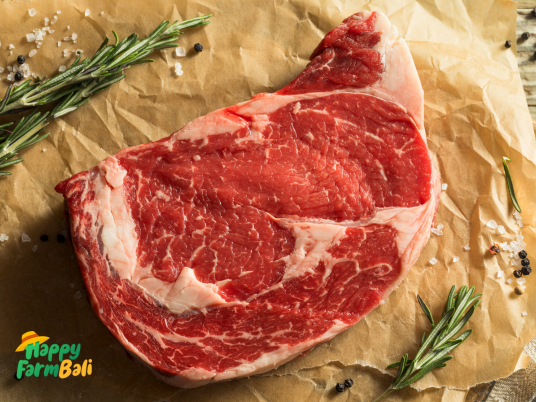
In Bali, the need for high-quality beef continues to increase along with the development of the culinary and tourism industry. Restaurants, hotels and other culinary businesses require beef that is not only delicious, but also safe and quality to ensure consumer satisfaction. To fulfill this need, the role of a trusted beef supplier is crucial. One of the best suppliers is one that provides imported products, as imported beef, especially from Australia and the United States, is known to have higher quality standards thanks to more modern and controlled farming systems.
One of the top recommendations for beef suppliers in Bali is Happy Farm Bali. As an experienced and reputable supplier, Happy Farm Bali provides a wide range of quality imported beef, especially from Australia, which is known for its strict farming and meat processing standards. The products offered by Happy Farm Bali include a variety of premium cuts such as tenderloin, ribeye, sirloin, to brisket, which are suitable for various types of cuisines, from steaks to traditional dishes. In addition, Happy Farm Bali guarantees that the beef they provide is always fresh and hygienically processed according to international standards.
Consumer trust in Happy Farm Bali is not only based on the quality of the products, but also on the professional and responsive service. This supplier ensures that deliveries are made on time and the meat is well packaged to maintain freshness until it reaches the consumer. With a commitment to quality and customer satisfaction, Happy Farm Bali has become the top choice for many restaurants, hotels and individuals in Bali who are looking for reliable and quality imported beef.

